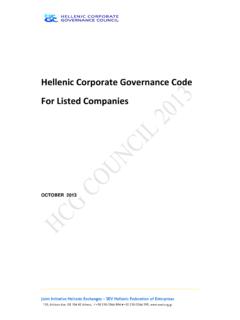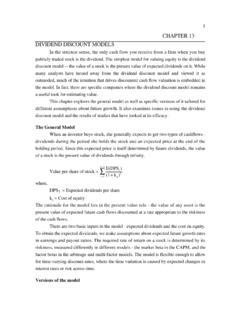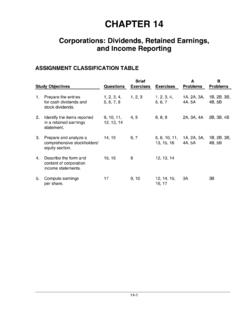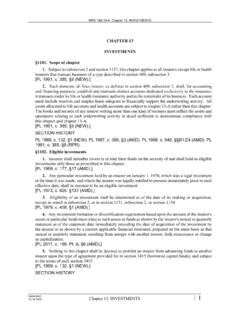Transcription of CODE on Corporate Governance
1 Approved by: Council of issuers on February 21, 2005. code . on Corporate Governance Financial Institutions' Association of Kazakhstan The city of Almaty year 2007. 1. TABLE OF CONTENTS. page Introduction 3. chapter 1 Principles of Corporate Governance 4. chapter 2. General meeting of shareholders 8. chapter 3. Board of directors 10. chapter 4. Executive body 12. chapter 5. Corporate secretary 13. chapter 6. Essential Corporate events 13. chapter 7. Disclosure of information 14. chapter 8. Сontrol of financial-economic activity 15. chapter 9. dividend policy 15. chapter 10. Manpower policy 16. chapter 11. Environmental protection 16. chapter 12. Conflicts of Corporate Governance 17. chapter 13. Conclusion 17. 2. INTRODUCTION. The present code on Corporate Governance (hereinafter referred to as the code ) is a statute of rules and recommendations, which the Company follows in its activity for provision of high level of business ethics in relations within the Company and other market's participants.
2 The code is based on the existing international experience in Corporate Governance and provisions of the Recommendation on applying principles of Corporate Governance by Kazakhstan joint stock companies, which was approved by the Decision of the Expert Council on Equity Market Issues at the National Bank of the Republic of Kazakhstan on September 24, 2002 (Minutes of Proceedings #319). The code was developed in compliance with the provisions of the existing legislation of the Republic of Kazakhstan, taking into account practice of Corporate behavior, ethical norms, requirements, terms and conditions of business activities of companies on equity market in the present stage of their development in Kazakhstan. The Company voluntarily accepts and follows provisions of the present code to reinforce the confidence of present and potential investors.
3 3. chapter 1. PRINCIPLES OF Corporate Governance . The Corporate Governance is based on fairness, honesty, responsibility, transparency, professionalism and competence. The effective structure of Corporate Governance supposes respect of rights and interests of all persons interested in the Company's activity, and contributes in successful activity of the Company, including market value increase and maintaining financial stability and profitability. The principles of Corporate Governance , set out in the present chapter , are aimed at gaining trust in relations which may arise for the purpose of Governance , and shall serve as a basis of all rules and recommendations, set out in further chapters of the code . The basic principles of the present code are as follows: - principle of protection of rights and interests of shareholders.
4 - principle of transparency and objectivity of disclosure of information on the Company's activity;. - principles of legality and ethics;. - principles of effective dividend policy ;. - principles of effective manpower policy ;. - environmental protection;. - policy of regulation of Corporate conflicts. The structure of Corporate Governance shall be in accordance with the legislation and clearly define responsibilities of all bodies of the Company. Observance of the principles of Corporate Governance shall contribute in taking of the effective approach to an objective analysis of the Company's activity and obtaining of the adequate recommendations from analysts, financial consultants and rating agencies. 1. PRINCIPLE OF PROTECTION OF RIGHTS AND INTERESTS OF SHAREHOLDERS.
5 The Company shall facilitate that its shareholders may easily exercise the following main rights: 1) the right to own, use and dispose shares, belonging to them;. 2) the right to apply to the Company with written request to provide it with information concerning activities of the Company and to receive motivated answers within the terms established by the Articles of Association of the Company;. 3) participate and vote in general shareholder meetings;. 4) the right to participate in election of the managerial bodies;. 5) the right to receive profits resulting from the Company's activity (dividends). The Company shall ensure effective participation of the shareholders in making key decisions on the Corporate management, such as nomination and election of the members of the Board of Directors.
6 The shareholders shall be entitled to express their opinion concerning remuneration policy for the members of the Board of Directors. 4. The Company's employees as well as all persons interested in the Company's activity shall be entitled freely inform the Board of Directors on illegal and unethical actions, and their rights shall not be infringed. The Company shall inform all its shareholders on the Company's activity according to the order provided for by the Articles of Association of the Company. The Company shall provide its shareholders with true information on its financial and economic activity. Mainly, it concerns transactions in joint stock capital (shares), which shall be to the maximum reasonable and transparent for the Company's shareholders. If the Company makes changes in its activity, then the Executive Body shall provide with well- grounded reasons for making such changes and shall submit specific perspectives for reservation and protection of rights of the shareholders.
7 All shareholders shall be treated equally under the same conditions. The Company shall protect minority shareholders against abuse of controlling shareholders. Shareholders, including institutional investors, may advise each other on issues of observance of main rights of the shareholders. 2. PRINCIPLE OF THE COMPANY'S EFFECTIVE MANAGEMENT. BY THE BOARD OF DIRECTORS AND EXECUTIVE BODY. A) Principles of activities of the Board of Directors. The Board of Directors shall act in the best interests of its shareholders and with the aim to increase of market value of the Company. The Board of Directors provides the shareholders with clear assessment of achieved results and perspectives of the Company through objective monitoring of the present state of business, and it secures maintaining and functioning of the reliable system of internal control and independent audit in order to preserve shareholders' investments and the Company's assets.
8 The Board of Directors shall ensure that the Company's risk management system is effective. It shall control Corporate conflicts and regulate them. The Board of Directors shall ensure complete transparency of its activities before the shareholders. The Board of Directors shall bear responsibility for disclosure of information and informational coverage of the Company's activities, and shall give good reason for classification of information and secure protection and safety of internal (business) information. The Board of Directors shall include independent directors. The Company shall define its own criteria of independence of directors on the basis of the provisions of legislation. The independent director shall not depend on control shareholder or managerial body of the Company.
9 5. The system of job evaluation and equitable remuneration of the members of the Board of Directors shall secure motivation of their work in the interests of the Company and all shareholders. The Board of Directors shall develop a mechanism of evaluation of its activities and work of definite directors, create and revise methods and criteria of evaluation of the activity of the members of the Board of Directors and the Executive Body as well as carry out control over activity of the Executive Body. Upon assumption as the member of the Board of Directors, such member shall bear responsibility for the Company's activities. The text of obligations of the member of the Board of Directors, assumed before the Company, the order of familiarization of the member of the Board of Directors with the Company's activities, the order of termination of authorities of the member of the Board of Directors, the order of voluntarily termination of authorities, the way of bringing to account for non-fulfillment of the undertaken liabilities, the order of calling and holding of the meetings of the Board of Directors are set out in the Company's Articles of Association and internal documents, which are developing by the Board of Directors and approving by the General Meeting of shareholders of the Company.
10 B) Principles of activities of the Executive Body. The Executive Body (collegial or sole) shall carry out the Company's daily work in compliance with its financial and economic plan. The activities of the Executive Body shall be built on the basis of maximal observance of the interests of the shareholders and accountability to the decisions of the General Meeting of shareholders of the Company and its Board of Directors. 3. PRINCIPLES OF TRANSPARENCY AND OBJECTIVITY OF DISCLOSURE OF. INFORMATION ON COMPANY'S ACTIVITIES. a) Disclosure of information on the Company's activities shall contribute in participation in the share capital of new shareholders and facilitate positive solution of investors. Informational transparency of the Company shall be based on an appropriate Corporate provision, worked out and approved by the Board of Directors.



















